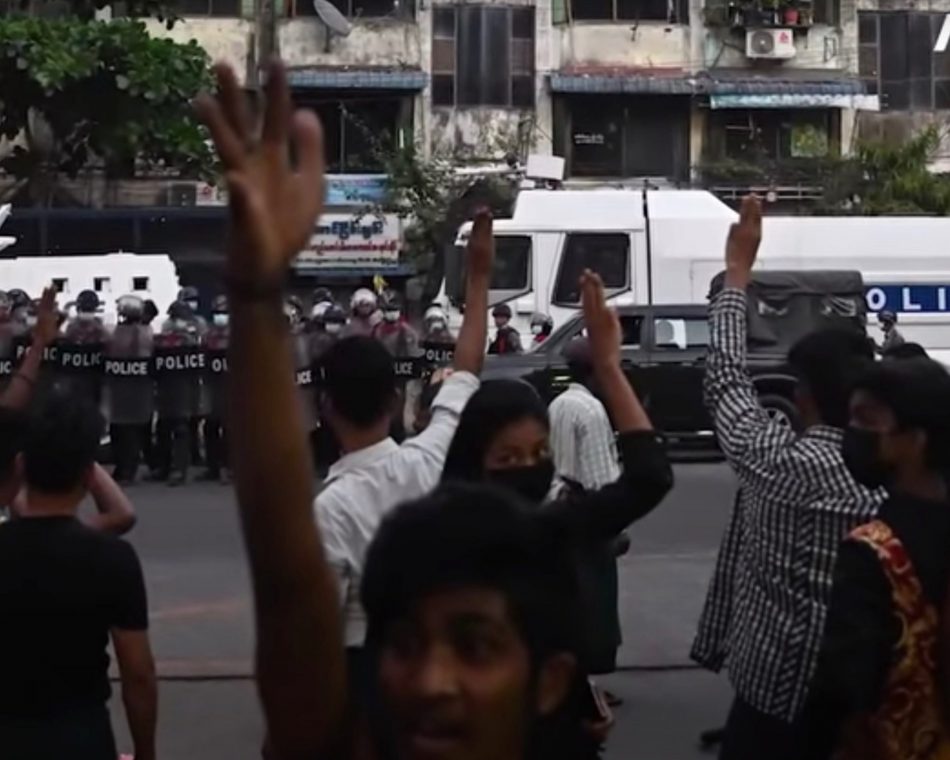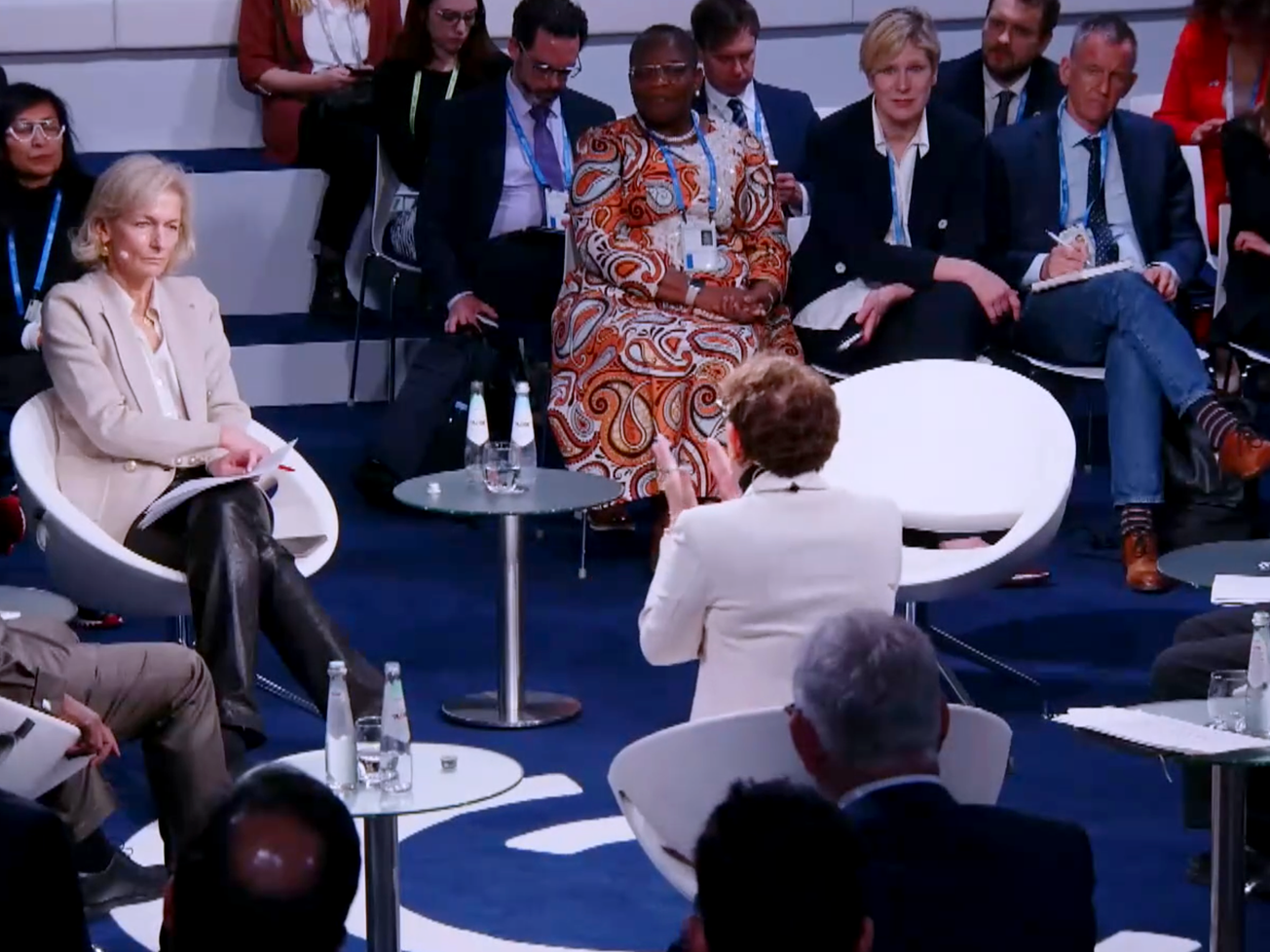UNITED NATIONS (AN) — The U.N. Security Council, the world body's most powerful arm, unanimously agreed to condemn violence against Myanmar protesters on Wednesday but stopped short of denouncing the military's coup and instead called for it to exercise the "utmost restraint."
Blocked by Myanmar's powerful neighbor China and Russia from taking a stronger stance by denouncing the coup, or from calling for the return of democratic governance or raising the possible use of sanctions, the 15-nation council adopted a "presidential statement" read by the council's monthly leader that was drafted by the United Kingdom, which ruled Myanmar as British Burma from 1824 to 1948. The statement carries moral authority, but not the weight of a binding resolution.
U.S. Ambassador to the U.N. Linda Thomas-Greenfield, who holds the council's monthly revolving presidency, read the statement demanding Myanmar's generals immediately release the nation's de facto leader, State Counsellor Aung San Suu Kyi, President Win Myint and other officials held since the Feb. 1 military coup.
The council said in its statement it "strongly condemns the violence against peaceful protestors, including against women, youth and children," and all health care workers, labor union members, journalists and others arbitrarily detained should be released.
It also called for the military to "exercise utmost restraint" and expressed its "continued support for the democratic transition in Myanmar, and stresses the need to uphold democratic institutions and processes, refrain from violence, fully respect human rights and fundamental freedoms and uphold the rule of law."
Today, every member of the UN Security Council spoke with one voice to condemn the ongoing violence against peaceful protestors in Burma. The U.S. will continue to work with international partners to promote accountability for coup leaders and those responsible for this violence.
— Ambassador Linda Thomas-Greenfield (@USAmbUN) March 10, 2021
Unity needed 'more than ever'
The council heard appeals for action last Friday but failed to reach agreement over how to respond to Myanmar's generals, who have been waging what the U.N. human rights chief called a "vicious crackdown" on peaceful demonstrators. A press statement from the council on February 4 urged the military to release Suu Kyi and others arbitrarily detained.
U.N. special envoy Christine Schraner Burgener, a Swiss diplomat and lawyer, urged the council in a closed-door briefing last Friday to denounce the violence and pressure Myanmar's military to restore democracy. Tens of thousands of demonstrators poured into the streets in the hope of ending the military coup.
"Your unity is needed more than ever on Myanmar. I have remained in close contact with the people of Myanmar across communities. They, including committed civil servants, are the real hopes and protectors of the nation's democratic progress," Schraner Burgener told the council.
"But the hope they have placed in the United Nations and its membership is waning — and I have heard directly the desperate pleas from mothers, students and the elderly," she said. "I receive every day around 2,000 messages — for international action to reverse a clear assault on the will of the people of Myanmar and democratic principles."
The prospect of any council action was unlikely with China and Russia holding two of the council's five permanent, veto-wielding council seats. France, the United States and the U.K. hold the other permanent seats. Schraner Burgener told the council there is nonetheless an "urgency" for collective action. “How much more can we allow the Myanmar military to get away with?” she asked.
The council also considered making a press statement, drafted by Ireland, calling for an end to several months of fighting between Ethiopian forces and Tigray regional leaders that has killed thousands of civilians and affected millions in need of humanitarian aid. Diplomats abandoned the draft statement, however, after China, India and Russia objected.
Special Envoy @SchranerBurgen1 to members of the @UN Security Council today. “I will continue my efforts in solidarity with the people of #Myanmar. Their hope will depend on unified support and action from the Security Council.” pic.twitter.com/7ngBmSgPZT
— UN Political and Peacebuilding Affairs (@UNDPPA) March 5, 2021
🇲🇲 #Myanmar: @MBachelet urges all those with information – incl. officials joining civil disobedience movement – to support international efforts to hold military leaders accountable for rights violations – citing @IntlCrimCourt & @CIJ_ICJ proceedings 👉 https://t.co/tuJ3oMQvLM pic.twitter.com/gq1fkUIESb
— UN Human Rights (@UNHumanRights) March 4, 2021
Documented attacks
U.N. human rights chief Michelle Bachelet demanded last Thursday that Myanmar's generals "halt their vicious crackdown" on peaceful demonstrators as her office confirmed at least 54 people have been killed by police and military officers since the coup began a month ago.
At least 30 were killed by security forces on March 3 alone in demonstrations at Magway, Mon, Mandalay, Sagaing and Yangon, the nation's commercial hub, according to Bachelet's Office of the United Nations High Commissioner for Human Rights at Geneva. Another person was killed a day earlier, OHCHR said, while 18 were killed the previous Sunday and five were killed before then.
But the actual death toll since the coup began could be "much higher," OHCHR said, and while it has been difficult to assess the number of injuries, credible information indicates that "at a minimum" there have been hundreds wounded in the protests.
“Myanmar’s military must stop murdering and jailing protestors,” Bachelet said. “It is utterly abhorrent that security forces are firing live ammunition against peaceful protesters across the country. I am also appalled at the documented attacks against emergency medical staff and ambulances attempting to provide care to those who have been injured.”
Bachelet, a former president of Chile whose political activism began with her family's opposition to the military-led coup in her home country in 1973, also expressed alarm at the targeting of journalists, including at least 29 that have reportedly been arrested. Eight of those were charged with alleged crimes such as incitement to oppose the government or attending an unlawful gathering.
“I urge all those with information and influence — including Myanmar officials who are now joining the civil disobedience movement — to support international efforts to hold military leaders accountable for the serious human rights violations that have been committed both now and in the past," she said.
#Myanmar: Military junta is illegal, illegitimate and responsible for widespread & systematic rights violations against peaceful protesters, and should be held accountable – @RapporteurUn urges decisive, unified action to put an end to brutality 👉 https://t.co/bmX3gRwCt3 #HRC46 pic.twitter.com/nD9qKGi0rL
— UN Special Procedures (@UN_SPExperts) March 4, 2021
The systematic brutality of the military junta is once again on horrific display throughout Myanmar. I urge members of the UN Security Council to view the photos/videos of the shocking violence being unleashed on peaceful protesters before meeting in Friday's close-door session. pic.twitter.com/6owx7ybhcN
— UN Special Rapporteur Tom Andrews (@RapporteurUn) March 4, 2021
'Simply unacceptable'
Thomas-Greenfield had told a press stakeout webcast live from New York last week that the United States was "gravely concerned" about the dramatic acceleration in the military's violent crackdown. "This is simply unacceptable," she said.
The U.N.'s independent human rights expert on Myanmar, Tom Andrews, had also urged the council to take “decisive and unified action against the military junta, including targeted sanctions, an arms embargo, and a referral to the International Criminal Court to investigate and prosecute atrocities committed since the coup on 1 February and those committed against ethnic groups in years prior.”
Andrews called the military junta "illegal, illegitimate and responsible for widespread and systematic human rights violations against nonviolent, peaceful protesters," and said it also has forcibly displaced thousands of people with "ethnic nationalities" from their homes.
“Every day the military junta in Myanmar unleashes more brutality on peaceful protesters who are standing up for justice, human rights and democracy, defending their nation against this illegal military coup,” he said. “While the future of Myanmar will be determined by its people, the international community must act urgently and decisively to support them."







